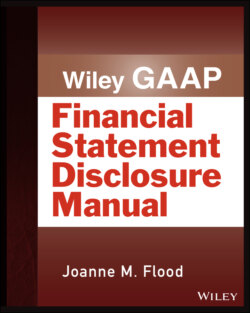Читать книгу Wiley GAAP: Financial Statement Disclosure Manual - Joanne M. Flood - Страница 127
Stock‐Based Compensation
ОглавлениеExample 7.52: Stock‐Based Compensation Valuations are based upon highly subjective assumptions about the future, including stock price volatility and exercise patterns. The fair value of share‐ based payment awards was estimated using the Black‐Scholes option pricing model. Expected volatilities are based on the historical volatility of the Company's stock. The Company uses historical data to estimate option exercise and employee terminations. The expected term of options granted represents the period of time that options granted are expected to be outstanding. The risk‐free rate for periods within the expected life of the option is based on the U.S. Treasury yield curve in effect at the time of the grant.
Example 7.53: Stock‐Based Compensation The Company accounts for stock‐based payments in accordance with the provision of ASC 718, which requires that all share‐based payments issued to acquire goods or services, including grants of employee stock options, be recognized in the statement of operations based on their fair values, net of estimated forfeitures. ASC 718 requires forfeitures to be estimated at the time of grant and revised, if necessary, in subsequent periods if actual forfeitures differ from those estimates. Compensation expense related to share‐based awards is recognized over the requisite service period, which is generally the vesting period.
The Company accounts for stock‐based compensation awards issued to nonemployees for services, as prescribed by ASC 718‐10, at either the fair value of the services rendered or the instruments issued in exchange for such services, whichever is more readily determinable, using the guidelines in ASC 505‐50. The Company issues compensatory shares for services including, but not limited to, executive, management, accounting, operations, corporate communication, financial and administrative consulting services.
